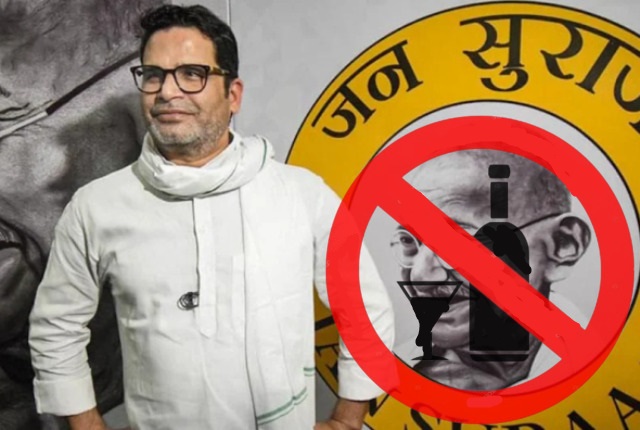Amidst the political buzz of the Bihar Assembly elections, Prashant Kishor, the new factor in the campaign, has promised to lift the alcohol ban. This has gained attention and is being widely discussed among the public, even though politicians remain largely silent about it.
The alcohol prohibition law has been in force in Bihar since 2016. It was a major issue in the 2020 Assembly elections as well. At that time, it was believed that the prohibition benefited Nitish Kumar, especially since women were happy with the decision, which was reflected in the voting patterns. This time too, the ban is being discussed, even though the ruling NDA leaders are avoiding public discussions on the topic.
This begs the question: What is it that the poll strategist in Prashant Kishor sees an opportunity in raking up the matter about scrapping a law which in the past seems to have benefitted the ruling establishment, his rivals in the poll? A close scrutiny would show that the Jan Suraaj Party leader is addressing those who have been affected by the law and those who have benefitted from it, the poor and low caste women.
The complaint about implementation of the law is largely against the police and excise department officials. The enforcement agencies are accused of prosecuting the consumer for illegally marketed alcohol and not the sellers, who are believed to pay heavily to ‘buy the license to sell.’
The general refrain is that an alcohol bottle that was used to be available for ₹200 earlier is now delivered at home ₹500. It is said, and not without reason, that this is the cost for the safe home delivery of liquor. Everyone, it is believed, knows whom to call and what to say to get alcohol delivered directly to their home.
But then, there is the community consisting women across caste, economic class and region, which silently supports it. It should not be forgotten that the whole movement demanding ban on sale and consumption of alcohol was led by a woman of lowly Mushar community from rural Bihar.
While women initially celebrated prohibition, many now see that the law’s implementation has bred corruption and victimized their own families. Thousands of households have seen male members arrested, and families driven further into poverty and hardships. Kishor’s pitch, therefore, is not merely a call to “lift the ban,” but to “end hypocrisy” – to frame prohibition as a failed, exploitative, and class-biased policy.
For the ruling NDA, especially Nitish Kumar, prohibition remains a delicate issue. While women still symbolically support it, its enforcement failures make open discussion politically risky. BJP allies, on the other hand, have privately expressed frustration over the law’s unpopularity in rural areas but maintain silence publicly to avoid alienating women voters.
Despite high degree of criticism (higher than it actually deserves), prohibition continues to enjoy a moral constituency, particularly among rural women. For them, it symbolizes dignity, peace at home, and control over family income. They see it as a measure of social justice and equality, especially in a patriarchal society where women’s voices are often muted.
It is also important to note that alcohol-related abuse, crime, and health issues had reached alarming levels in Bihar before prohibition. Lifting the ban without a robust system of regulated sale and awareness could risk a relapse into that chaos.
The call to scrap prohibition in Bihar touches upon deep questions of morality, governance, and political pragmatism. The law, while borne out of genuine social reform, has degenerated into a system that punishes the poor, enriches the corrupt, and drains state resources. Prashant Kishor’s challenge is therefore not limited only to Nitish Kumar’s policy but to the very idea that symbolic morality can replace effective governance.
Scrapping prohibition outright might be politically risky, but reforming it is both necessary and inevitable. A nuanced, balanced policy – one that respects women’s rights, curbs corruption, and restores economic rationality – would be the truly prudent decision for Bihar’s future.
(The writer is an established Author, Academic and President of the Centre for Reforms, Development & Justice)

